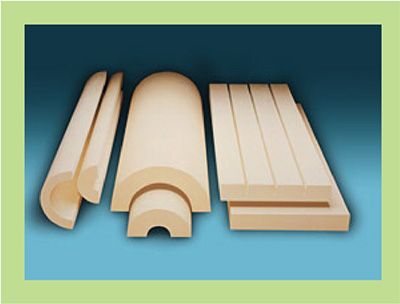Exploring Insulation Materials: Granular Insulations
Calcium Silicate
Calcium Silicate thermal
insulation is defined by ASTM as insulation composed principally of hydrous
calcium silicate, and which usually contains reinforcing fibers.
Calcium Silicate Block
and Pipe Insulation are covered in ASTM C533. The standard contains three
types, classified primarily by maximum-use temperature and density.
The standard limits
the operating temperature between 80° and 1,700°F.
Calcium Silicate
Insulation Products
Calcium Silicate pipe
insulation is supplied as hollow cylinder shapes, split in half lengthwise, or
as curved segments. Pipe insulation sections typically are supplied in lengths
of 36″ and are available in sizes to fit most standard pipe sizes. Available
thicknesses range from 1″ to 3″ (in one layer). Thicker insulation is supplied
as nested sections.
Calcium Silicate
block insulation is supplied as flat sections in lengths of 36″; widths of 6″,
12″, and 18″; and thickness from 1″ to 4″. Grooved block is available for
fitting block to large-diameter curved surfaces.
Special shapes, such
as valve or fitting insulation, can be fabricated from standard sections.
Calcium Silicate is
normally finished with a metal or fabric jacket for appearance and weather
protection.
The specified
maximum thermal conductivity for Type I is 0.41 Btu-in/(h?ft²?°F) at a mean
temperature of 100°F. The specified maximum thermal conductivity for Types IA
and Type II is 0.50 Btu-in/(h?ft²?°F) at a mean temperature of 100°F.
The standard also
contains requirements for flexural (bending) strength, compressive strength,
linear shrinkage, surface-burning characteristics, and maximum moisture content
as shipped.
Typical applications
include piping and equipment operating at temperatures above 250°F, tanks,
vessels, heat exchangers, steam piping, valve and fitting insulation,
boilers, vents, and exhaust ducts.


